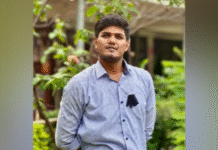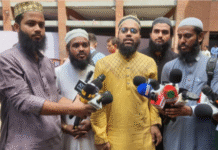
Founded at Rose Garden in Dhaka in 1949, the Bangladesh Awami League is set to begin its 20th national conference at Suhrawady Udyan today after travelling a long path of struggle for the liberation of the country and fighting along with others to restore democracy.
The party had experienced so many ups and downs as in its 67 years it was dissolved, split, got top leaders killed and remained out of power for 21 years at a stretch, according to party
documents and Banglapedia.
The party was founded in Rose Garden in Dhaka on June 23, 1949 at a convention of a breakaway group of the Bengal Provincial Muslim League as Awami Muslim League electing Maulana Abdul Hamid Khan Bhashani president, Shamsul Hoque general secretary and Sheikh Mujibur Rahman, Khondakar Mostaq Ahmad and AK Rafiqul Hussain joint secretaries.
The party held its first council session in Mymensing in 1953 when Maulana Abdul Hamid Khan Bhashani retained his post while Sheikh Mujibur Rahman was made general secretary.
In the later part of that year, the party held its second (special) council session that resolved to form the Jukta Front (United Front), a combine of opposition parties.
Jukta Front got an overwhelming majority in the 1954 general elections and formed government. Dropping the word ‘Muslim’ from its name, the party became Awami League in the third council session in Dhaka in 1955.
In the 24 years of Pakistan, the Awami League was in power in the province for only about two years and at the centre for 13 months as a coalition government.
In 1957, the Awami League faced an organisational crisis as Husain Shaheed Suhrawardy and Maulana Bhasani differed fundamentally on the issue of Pakistan foreign policy.
The division came to surface at the fourth conference of the party at Kagmari in Tangail in 1957, when Maulana Bhashani and Sheikh Mujib both retained their positions. As Moulana Bhashani later left the party, Maulana Abdur Rashid Tarkabagish was made acting president.
Then Pakistan’s president, Iskandar Mirja, imposed martial law in 1958 and banned politics.
During general Ayub Khan’s autocratic regime (1958-1969), Sheikh Mujibur Rahman consolidated his grip on the party and started earning popularity by organising nationalist movement and Suhrawardy’s death in 1963 enabled Mujib to become the sole leader of the party.
In the fifth council session in Dhaka in 1964, the party was revived and Maulana Abdur Rashid Tarkabagish and Sheikh Mujib were made president and secretary respectively.
Mujib was made party president and Tajuddin Ahmad general secretary in three councils in a trot in 1966, 1967 and 1970, when the party activists participated in all democratic and nationalist movements in the then East Pakistan which ended through the war of independence in 1971.
Mujibnagar government was formed by Awami League in 1971 with Sheikh Mujib, who was in jail in Pakistan, as president and Tajuddin Ahmed as prime minister. The government in exile led the war of liberation. The party formed the first government following parliamentary democracy as Sheikh Mujib was made prime minister.
After the liberation AL held its ninth council session in 1972, when Sheikh Mujib retained his position and Zillur Rahman was made general secretary.
The 10th council session in 1974 amended the party constitution to keep the prime minister out of the party and Sheikh Mujib vacated the position of the party president. The council session made AHM Qamaruzzaman party president Zillur general secretary.
State of emergency was proclaimed on December 28, 1974 by the AL government as political situation deteriorated. The country was transformed into presidential system and the Awami League merged into the Bangladesh Krishak Sramik Awami League (BKSAL), the single party that replaced multi-party parliamentary democracy in 1975.
Taking the opportunity of these negative developments, a group of army army officers assassinated Sheikh Mujib, along with all but two of his family members, on August 15, 1975, and killed four of top AL leaders – Syed Nazrul Islam, Tajuddin, M Mansur Ali and Qamaruzzaman – inside the Dhaka Central Jail on November 3, 1975.
AL, however, was revived in 1976, under the Political Parties Regulations promulgated by the Martial Law government of General Ziaur Rahman. The party suffered a split. In the 11th council session in April 3-4, 1977, Johra Tajuddin, wife of Tajuddin, was made convener of the 44-member convening committee of party.
The 12th council session made Abdul Malek Ukil president and Abdur Razzque general secretary. Sheikh Hasina, the eldest daughter of Sheikh Mujib, after six years of self exile since the 1975, returned home in May 1981 and took the helm of the Awami League as she was elected party president in the 13th council session in February 1981 while still abroad. Abdur Razzaque was made the general secretary. as he left the party in 1982, Syeda Sajeda Chowdhury was made acting general secretary.
Since 1981, Hasina, was made party president in 14th to 19th conferences in 1987, 1992, 1997, 2000, 2002, 2009 and 2012.
Syeda Sajeda Chowdury was made general secretary in 1987, Zillur Rahman in 1992 and 1997, Abdul Jalil in 2002 and Syed Ashraful Islam in 2009 and 2002.
During the period the party along with others successfully led movement against autocratic HM Ershad. The party and its alliance in 1996 forced the government to hold general election under a non-party caretaker government, and came to power in June 1996 after 21 years.
In the general elections in 2001 the Awami League suffered a smashing defeat to the Bangladesh Nationalist Party-led alliance and the AL-led alliance came out victorious in the next elections under the military-controlled interim regime in 2008.
The party retained its power by winning the January 5, 2014 general election boycotted by all opposition parties.
Source: New Age









